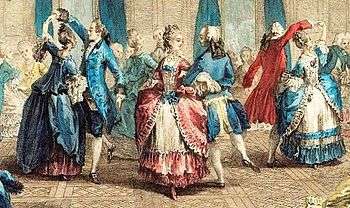Aristocracy (class)
The aristocracy[1] is a social class that a particular society considers its highest order. In many states, the aristocracy included the upper class of people (aristocrats) with hereditary rank and titles.[2] In some, such as ancient Greece, Rome, and India, aristocratic status came from belonging to a military caste. It has also been common, notably in African societies, for aristocrats to belong to priestly dynasties. Aristocratic status can involve feudal or legal privileges.[3] They are usually below only the monarch of a country or nation in its social hierarchy.[4] In modern European societies, the aristocracy has often coincided with the nobility, a specific class that arose in the Middle Ages, but the term "aristocracy" is sometimes also applied to other elites, and is used as a more generic term when describing earlier and non-European societies.[5]


Etymology
The term aristocracy derives from the Greek ἀριστοκρατία (aristokratia from ἄριστος (aristos) "excellent" and κράτος (kratos) "power").[6] In most cases, aristocratic titles were and are hereditary.
The term "aristokratia" was first used in Athens with reference to young citizens (the men of the ruling class) who led armies at the front line. Aristokratia roughly translates to "rule of the best born". Due to martial bravery being highly regarded as a virtue in ancient Greece, it was assumed that the armies were being led by "the best." This virtue was called arete (ἀρετή). Etymologically, as the word developed, it also produced a more political term: aristoi (ἄριστοι). The term aristocracy is a compound word stemming from the singular of aristoi, aristos (ἄριστος), and the Greek word for power, kratos (κράτος).
From the ancient Greeks, the term passed to the European Middle Ages for a similar hereditary class of military leaders, often referred to as the nobility. As in Greece, this was a class of privileged men and women whose familial connections to the regional armies allowed them to present themselves as the most "noble" or "best" of society.
See also
- Gentry (United Kingdom)
- Honorifics
- Monarchy
- Nobility
- List of fictional nobility
- Upper class
- Imtiaz (Egypt)
- Chieftaincy (Nigeria)
- Old money
- Peerage (United Kingdom)
- Royal and noble ranks
- Styles (manner of address)
- Styles (royal and noble)
- Styles (United Kingdom)
- Titles
- Titles (false)
- Titles (hereditary)
- Titles (honorary)
- Social capital
- Social environment
- Symbolic capital
- Honour
- Moral responsibility
- Yangban (Korea)
- Kuge (Japan)
References
- https://www.dictionary.com/browse/aristocracy, Definition of Aristocracy
- https://www.merriam-webster.com/dictionary/aristocracy, Definition(2) of Aristocracy
- The aristocrats: a portrait of Britain's nobility and their way of life today, by Roy Perrott, (London 1968), page5-10
- https://www.lairdofblackwood.com/british-aristocracy/, Native Wood Preservation Ltd, on British Aristocracy and Hierarchy
- https://www.britannica.com/topic/aristocracy, Modern European societies and the nobility of aristocracy
- The Oxford Companion to British History, John Cannon (Editor), Oxford University Press, 1997, ISBN 978-0-19-866176-4
External links
| Wikiquote has quotations related to: Aristocracy |
| Look up aristocracy in Wiktionary, the free dictionary. |